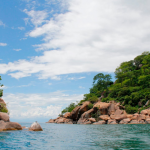Will Malawi’s oil resources be a blessing or a curse?
Published on October 22, 2012 at 8:52 AM by FACE OF MALAWI
With its natural resources, Malawi has the opportunity to take the road less travelled: that of transparency, accountability and shared prosperity.
The discovery of oil under Lake Nyasa (known as Lake Malawi in Malawi) holds great promise for one of the poorest countries in the world. With an economy dependent on agriculture and one of the world’s lowest GDP per capita, oil wealth could revolutionise the fortunes of Malawi’s economy.
At the same time, however, the experiences of some other oil rich nations on the continent point to a different possible ending, courtesy of the so-called ‘resource curse’ whereby instead of contributing to a stronger economy and prosperous society, the valuable asset facilitates the rise of fat cat oil barons, institutionalised corruption and environmental catastrophe while the general populace is left in the same, if not greater, poverty as before.
The lucky few
Ghana provides one relatively positive example Malawi could follow. In Ghana, awareness of oil management best practice alongside international scrutiny of the fledgling industry has afforded civil society a loud voice. A report released by Ghana Civil Society Platform on Oil and Gas, for example, addressed holes in Ghanaian oil law and was trumpeted as “a big milestone” for Ghanaian civil society by Moussa Ba, Oxfam America’s West Africa regional coordinator for extractive industries.
Unfortunately, however, even tentative success stories like the Ghanaian case are few and far between on the continent. In West Africa, the roads travelled have been varied, but the ultimate destination for many countries has been the same: The enrichment of a few at the expense of development for the many.
In Nigeria, exports of around two million barrels per day has been accompanied by endemic and institutionalised corruption: oil governs politics, rewarding petroleum “playboys” while the average Nigerian can expect to earn $2000 per year before dying at the age of 52. Not to mention the environmental catastrophe in the Niger Delta.
Just down the coast, the Obiang clan of Equatorial Guinea is filled with poster boys for mismanagement and impunity. Imposing journalistic blackout since the mid-2000s, President Teodoro Obiang has provided international guests with purpose built villas and Cadillacs off the back of enormous GDP growth whilst simultaneously providing his people with one of the worst human rights records in the world.
Further down the coast, Angola is an oil industry darling. The exclave province of Cabinda showcases the worst of the injustice wrought by the oil industry. On the Malongo compound, oil workers have their pick of facilities: organic vegetables, tennis on manicured lawns and, just outside the gate, a plethora of young destitute Angolan women forced to straddle the fine line between take-away bride and prostitute.
But Africa’s tyrants are not the only ones to blame. High up in glittering office buildings in Lagos, London and Houston sit oil executives exploiting legal loopholes and corporate social responsibility rhetoric to operate in high risk zones without damage to their reputations, and enormous benefits to their bank balances.
Learning from others or forging another path?
The signs coming from Malawi so far are mixed. According to Ibibia Worik, an extractives expert at the Commonwealth Secretariat, “A discovery would transform the Malawian economy from its current struggles into a multi-billion dollar one in an instant”. The mechanisms by which such enrichment should, indeed must, take place are well known: transparency around the allocation of licenses and revenues; the establishment of an oil revenue management fund; and ongoing investment in other productive areas of the economy. Such measures would provide citizens with the means to hold their governments to account over oil governance, and an assurance of continued stability when wells run dry.
President Banda showed a deft hand and lack of patience regarding rumours of corruption around the allocation of an exploration license to UK-based Surestream Petroleum. Launching a government probe into the deal in August this year, she told the press, “We have heard that there were underhand dealings in this contract so we would like to find out the truth”.
But aside from launching the probe, Banda has given little signal of how oil will be managed. The lack of discussion around how revenues will be distributed to ordinary Malawians is unnerving, as is the silence on how she intends to safeguard fishing communities dependent on the lake from the inevitable impacts of large-scale oil exploration. Banda will need to show a firm hand here too if the murky waters surrounding contract allocation are anything to go by.
Rumour has it
Worryingly, the rumours going round have come straight from the horse’s mouth. Former Minister of Natural Resources, Grain Malunga, claims there was pressure from State House to award the contract to Surestream adding, “Perhaps that is one of the reasons why I was dropped, because I wanted to bring sanity to the process”. By the time of this going to print, the author has received no comment from Surestream on the allegations.
An aspect of business Surestream is keen to comment on, however, is their charitable portfolio. Flying the oil-for-development flag, CEO Chris Pitman states, “Surestream Petroleum is a strong believer in investing in the country, and to date, we have already spent in excess of $500,000 on social investment programmes”.
Given the estimated profits to be made, the pledged $100,000 per year to social projects seems a paltry sum. Furthermore, if the rumours of kickbacks hold water, Surestream’s protestations of concern for the average Malawian would be stripped of any legitimacy. Not an auspicious start.
If Banda and her cabinet get it right, Malawi could act as a leading light for those others in the region that are being swept along in the gold rush. If they get it wrong, the consequences will be dire not just for the country, but the region as a whole.
The oil under Malawian territory does not to politicians, oil executives or militia men, but to the people of Malawi. Banda and her government have a duty to ensure ordinary Malawians see the benefits of this wealth, but the buck does not stop there. The international community must also shine a spotlight on Malawi, show no tolerance for opacity around its oil dealings, and support its leaders to allow oil wealth to be a blessing and not a curse.


